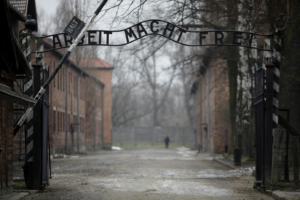My mother shopped for Christmas gifts all year long. By the time I was 8 or 9, I’d given up on the quaint idea of writing a wish list. “I’ve already bought all your presents,” she would inform me by the first of December, in a tone I can only describe as smug. “I’ve had them for weeks now.” She had a knack for finding things I never would have asked for but ended up treasuring: an album whose adhesive pages she’d filled with sheets of colorful stickers; a pale blue vintage perfume bottle; a small wooden box hand-carved with a moon and stars; an old green electric typewriter on which I composed several unfinished mystery novels. Many of my favorite gifts from her, I now know, were thrift or antique-shop finds; the little heart necklace I loved and wore for years came from a pawn shop. Money was tight and she was good at hunting for bargains, but she also couldn’t see the point of giving someone a present unless it was both a quirky surprise and “just the right thing.”
Her delight in gift-giving was matched in every other holiday activity she undertook. She oversaw our Christmas decorations, from the tree we cut and hauled home from the woods to the Nativity creche whose figurines we arranged just so, and painted our living-room windows in wintry scenes. She wrapped presents with care, showing me how to curl ribbon and create special bows. Though she never much enjoyed cooking, she reveled in holiday baking: buttery spritz cookies dusted with sprinkles, peanut-butter buckeyes, her favorite gingerbread, and her mother’s strudel. Her Christmas spirit was infectious, or maybe just unavoidable—she signed me up to go caroling every year (she herself was tone-deaf) and my father to dress up as St. Nick and hand out candy canes to kids at their church. She was also the reason our holiday celebrations lasted a full month, starting with chocolate left in my shoes on St. Nicholas Day (December 6) and ending with a final “bonus gift” on Epiphany, or the Three Kings Day (January 6). I loved this tradition most of all—as my mother said, it was “a second shot at Christmas.” Even then, she was reluctant to see the season end, and often had to be persuaded to take down our tree in mid- to late January.
My dad died on Epiphany in 2018. By Christmas that year, my mom had been diagnosed with cancer. She was sick for that holiday, and the one after, but of course she still felt like celebrating, determined to savor every possible moment of happiness with her grandchildren.
The long pandemic winter of 2020 brought my first Christmas without both of my parents. I participated in my family’s holiday rituals, hoping more than believing that the predictable delights would offer a kind of respite from my grief, but I was still sad all the time and felt like I was only going through the motions for the sake of my kids. I was constantly being ambushed by little things I hadn’t known would hurt, like not getting a box of treats from my mother on St. Nicholas Day—long after I’d left home, she’d continued to send me chocolate every December 6—or coming across things I would have wanted to give her if she were alive. After isolating and testing, we were lucky to get to spend a couple of days with my husband’s family, but all I could think about was the fact that my parents would miss this and every future holiday, milestone, and celebration.
Hardest of all, to my surprise, was being bombarded with recollections of Christmases past, reminders of time my parents and I would never get back. Sometimes I tried to share these memories with others, but in that haze of heavy grief, it was often impossible to summon and describe them. As the sole surviving member of the family I’d grown up in, I wasn’t able to fully convey what the holidays were like when I was young, or precisely how my mother looked and sounded decades before her grandchildren knew her, or what the little house I grew up in—a house they never saw—looked like all decked out for Christmas. Surrounded by people I loved, I felt unexpectedly and unbearably lonely, realizing that I truly was the only person left who could recall these and a thousand other things.
Christmas the following year felt much the same, and I worried that holidays without my parents would always bring these feelings of isolation and anguish. But last year, as I spoke to my kids about my mother’s abundant love for our Christmas festivities, and how excited she always was watching me open the presents she’d acquired over the last year, I felt real warmth, the urge to smile, alongside the expected wave of pain.
I’m not sure what’s changed. It’s not that the grief is gone, or even significantly lessened—I am aware of it every day. There are still times when “celebration” is a task I must dutifully work at, not something I feel in my heart. But I also know that carrying certain memories alone doesn’t mean that I am alone, and I’ve come to appreciate the ones that surge on holidays and birthdays and important anniversaries, letting them keep me company even when they bring sadness.
Since last Christmas, I’ve given myself permission to purchase small presents with my mother in mind. Not every time, but sometimes, when I see something I know she would have loved, I let myself buy it instead of just feeling a pang and wishing I could. I keep some of these items and give others as gifts, like the small opal ring my daughter now wears. I’ve also started incorporating some of my mom’s favorite traditions as a way of remembering her: my kids got treats on St. Nicholas Day, and I’ll set aside a single present each for them to unwrap on Epiphany. Though there’s still no one else who remembers what our Christmases were like when I was a child, I can tell my daughters what my mom used to do for me, sharing her irrepressible holiday spirit.
My parents feel closer this time of year because I associate it so strongly with them, and that’s something that now makes me thankful rather than feel empty and battered. It can be a complicated and bittersweet season, as many who face the holidays after losing a loved one can attest. But now, three years after losing my mom, I think I’ve gotten better at living with joy and grief at once, no longer expecting one to rise up and conquer the other. After all, when my mother and father were alive, the burdens they carried didn’t disappear just because it was Christmas. There were many years when someone was sick or out of work, angry or afraid; we still had our losses and our disappointments, reasons to mourn as well as celebrate. The holidays were never a perfect idyll for us, just a time when we chose to be happy together—all the more precious, perhaps, in years when our happiness was hard-won.




